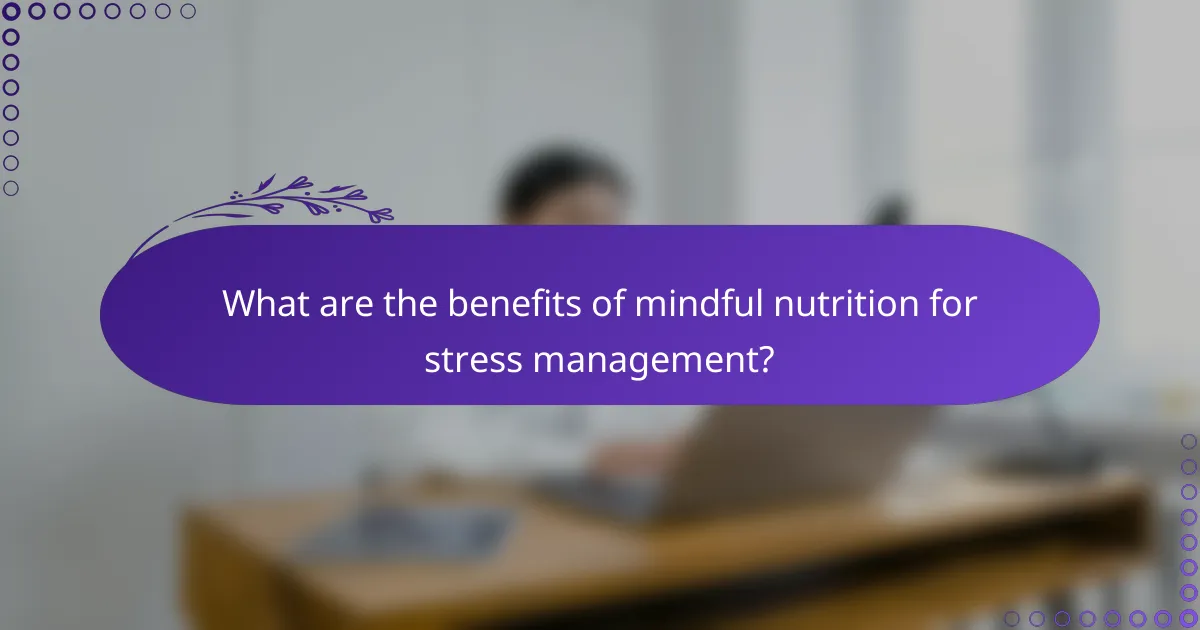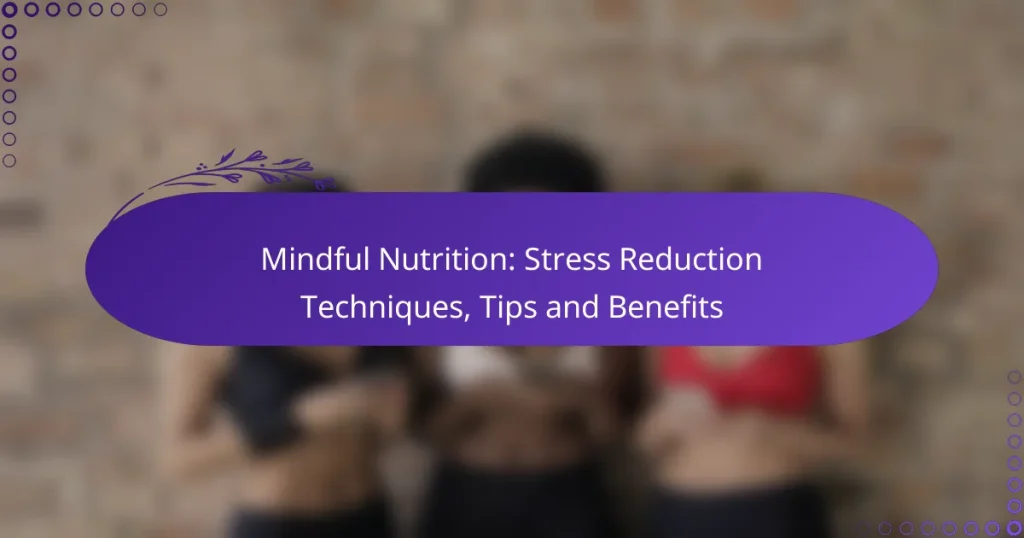Mindful nutrition is a powerful approach to stress reduction that emphasizes awareness of food choices and eating habits. By fostering a healthier relationship with food, individuals can enhance their mental clarity and emotional balance, leading to lower stress levels and improved well-being.

What are effective stress reduction techniques in mindful nutrition?
Effective stress reduction techniques in mindful nutrition focus on enhancing awareness of food choices and eating habits to promote relaxation and well-being. These techniques help individuals manage stress by fostering a healthier relationship with food and encouraging practices that support mental clarity and emotional balance.
Mindful eating practices
Mindful eating involves paying full attention to the experience of eating, including the taste, texture, and aroma of food. This practice encourages individuals to slow down, savor each bite, and recognize hunger and satiety cues, which can lead to better digestion and reduced stress. To implement mindful eating, try to eat without distractions, such as screens or multitasking.
Consider setting aside specific times for meals where you can focus solely on eating. Chewing slowly and appreciating the flavors can enhance your enjoyment and help you feel more satisfied.
Breathing exercises
Breathing exercises are a powerful tool for stress reduction that can be easily integrated into your daily routine. Techniques such as deep breathing or diaphragmatic breathing can help calm the nervous system and reduce anxiety, making it easier to approach meals with a clear mind. Aim for a few minutes of focused breathing before meals to center yourself.
For example, try inhaling deeply for a count of four, holding for four, and exhaling for a count of four. Repeat this cycle several times to promote relaxation before eating.
Meal planning for stress relief
Meal planning can significantly reduce stress by providing structure and ensuring that nutritious options are readily available. By planning meals ahead of time, you can avoid last-minute decisions that may lead to unhealthy choices. Focus on incorporating a variety of whole foods, such as fruits, vegetables, whole grains, and lean proteins, which can enhance mood and energy levels.
Consider dedicating a specific day each week to plan and prep meals. This can include chopping vegetables, cooking grains, or preparing snacks, making it easier to maintain healthy eating habits during busy days.
Mindful cooking methods
Mindful cooking methods emphasize the process of preparing food as a form of meditation. Engaging fully in the cooking process can help reduce stress and create a sense of accomplishment. Techniques such as chopping vegetables mindfully or focusing on the aromas and colors of ingredients can enhance your connection to food.
Try to create a calming cooking environment by playing soft music or using pleasant scents, such as herbs or spices, to make the experience more enjoyable. This can transform cooking into a therapeutic activity rather than a chore.
Herbal teas for relaxation
Herbal teas can be an effective way to promote relaxation and reduce stress. Varieties such as chamomile, lavender, and peppermint are known for their calming properties and can be enjoyed throughout the day or as part of a bedtime routine. Drinking herbal tea can also serve as a mindful ritual, allowing you to take a moment for yourself.
To maximize the benefits, consider brewing a cup of herbal tea when you feel overwhelmed. Take a few minutes to savor the warmth and aroma, focusing on the present moment to help alleviate stress.

How does mindful nutrition impact stress levels?
Mindful nutrition significantly reduces stress levels by promoting awareness of food choices and their effects on the body. By focusing on the nutritional value and emotional impact of meals, individuals can create a more balanced relationship with food, leading to lower stress and anxiety.
Reduces cortisol levels
Mindful nutrition helps lower cortisol, the hormone associated with stress, by encouraging the consumption of nutrient-dense foods. Foods rich in omega-3 fatty acids, antioxidants, and vitamins can help regulate cortisol production. Incorporating items like fatty fish, leafy greens, and nuts into your diet can be beneficial.
Additionally, practicing mindfulness during meals, such as eating slowly and savoring each bite, can further decrease cortisol levels by reducing emotional eating and promoting relaxation.
Improves emotional well-being
Engaging in mindful nutrition fosters a positive emotional state by enhancing the connection between food and mood. When individuals are aware of how certain foods affect their feelings, they can make better choices that support emotional health. For instance, complex carbohydrates can boost serotonin levels, improving mood.
Moreover, sharing meals with others and enjoying the social aspect of eating can enhance emotional well-being, reducing feelings of isolation and stress.
Enhances focus and clarity
Mindful nutrition can improve focus and mental clarity by providing the brain with essential nutrients. Foods high in vitamins B, D, and omega-3s are known to support cognitive function. Regularly including whole grains, fruits, and vegetables in your diet can lead to better concentration and reduced mental fatigue.
To maximize these benefits, consider planning meals that are balanced and varied, ensuring you receive a wide range of nutrients that support brain health. Avoiding processed foods and excessive sugar can also help maintain steady energy levels and mental sharpness.

What are the benefits of mindful nutrition for stress management?
Mindful nutrition offers several benefits for stress management by promoting awareness of food choices and eating habits. This approach helps individuals make healthier decisions, balance their meals, and improve overall digestive health, which can significantly reduce stress levels.
Promotes healthier food choices
Mindful nutrition encourages individuals to pay attention to what they eat, leading to healthier food choices. By focusing on the flavors, textures, and nutritional content of foods, people are more likely to select whole, unprocessed options over sugary or fatty snacks.
For example, choosing fresh fruits and vegetables instead of processed snacks can provide essential vitamins and minerals that support mental well-being. Keeping a food diary can also help track choices and identify patterns that may contribute to stress.
Encourages balanced eating habits
Practicing mindful nutrition fosters balanced eating habits by promoting regular meal times and portion control. This approach helps individuals avoid extreme hunger or overeating, both of which can increase stress levels.
Setting specific meal times and planning balanced meals that include proteins, healthy fats, and carbohydrates can stabilize blood sugar levels and mood. Aim for three meals a day with healthy snacks in between to maintain energy and reduce stress-related cravings.
Supports digestive health
Mindful nutrition supports digestive health, which is closely linked to stress management. Eating slowly and savoring each bite can improve digestion and nutrient absorption, reducing gastrointestinal discomfort that often accompanies stress.
Incorporating fiber-rich foods like whole grains, fruits, and vegetables can promote healthy digestion. Staying hydrated and limiting caffeine and alcohol can also contribute to better digestive health, further alleviating stress. Aim for at least 8 cups of water daily to support overall well-being.

What role do specific foods play in stress reduction?
Certain foods can significantly influence stress levels by providing essential nutrients that support brain health and mood regulation. Incorporating specific items into your diet can help mitigate the effects of stress and promote overall well-being.
Omega-3 fatty acids
Omega-3 fatty acids are known for their anti-inflammatory properties and their role in brain function. Foods rich in omega-3s, such as fatty fish (like salmon and mackerel), walnuts, and flaxseeds, can help lower stress hormones and improve mood.
Aim to include omega-3-rich foods in your diet at least twice a week. This can enhance your body’s ability to cope with stress and may even reduce anxiety levels.
Antioxidant-rich fruits
Fruits high in antioxidants, such as berries, oranges, and kiwi, can combat oxidative stress in the body, which is linked to increased stress levels. These fruits help neutralize free radicals and support overall health.
Incorporating a variety of colorful fruits into your daily meals can provide a broad spectrum of antioxidants. Aim for at least two servings of these fruits each day to maximize their stress-reducing benefits.
Whole grains
Whole grains, such as brown rice, quinoa, and oats, are rich in fiber and can help stabilize blood sugar levels. Stable blood sugar can lead to more consistent energy levels and a reduced likelihood of mood swings, which can contribute to stress.
Try to replace refined grains with whole grains in your meals. A simple switch, like choosing whole grain bread or pasta, can make a significant difference in your stress management efforts.

How can I implement mindful nutrition in my daily routine?
Implementing mindful nutrition involves being present and intentional about your eating habits. By focusing on your meals and the experience of eating, you can enhance your relationship with food and reduce stress.
Set regular meal times
Establishing regular meal times helps create a routine that can reduce stress and improve digestion. Aim to eat at similar times each day, which can help regulate your body’s hunger signals and promote a balanced metabolism.
Consider planning meals around your daily schedule, allowing for flexibility while maintaining consistency. For example, try to have breakfast within an hour of waking up and schedule lunch and dinner at similar times each day.
Practice gratitude for food
Practicing gratitude for your food can enhance your eating experience and foster a positive mindset. Take a moment before meals to acknowledge where your food comes from and the effort involved in its preparation.
You might consider keeping a gratitude journal where you write down what you appreciate about your meals, whether it’s the flavors, the nourishment, or the company you share it with. This simple practice can transform your perspective on food.
Limit distractions during meals
Limiting distractions during meals allows you to fully engage with your food and the act of eating. Try to avoid screens, such as phones or televisions, and focus on the flavors and textures of your meal.
Create a calm eating environment by setting the table, turning off electronic devices, and enjoying your meal in a quiet space. This practice can help you recognize when you are full and enhance your overall satisfaction with your meals.

What are the prerequisites for practicing mindful nutrition?
Practicing mindful nutrition requires self-awareness and a willingness to engage with your eating habits. It involves understanding your relationship with food, recognizing emotional triggers, and being present during meals.
Understanding personal stress triggers
Identifying personal stress triggers is essential for practicing mindful nutrition. Common triggers can include work pressure, relationship issues, or financial concerns. Recognizing these stressors helps you understand when you might turn to food for comfort.
To effectively manage stress, consider keeping a journal to track your emotions and eating patterns. This can reveal patterns between stress and food choices, enabling you to make more conscious decisions about what and when to eat.
Additionally, practicing relaxation techniques, such as deep breathing or meditation, can help mitigate stress responses. This awareness allows you to approach meals with a clearer mind, fostering healthier eating habits and reducing emotional eating.


